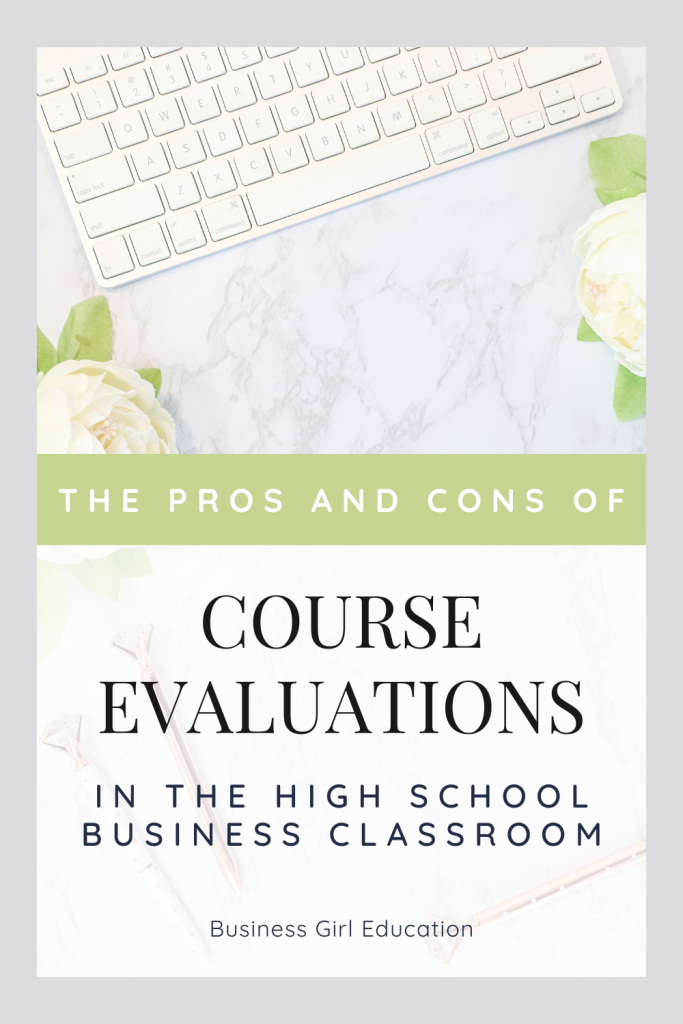As the semester draws to a close, many teachers contemplate the effectiveness of their teaching methods and the overall learning experience for their students.
One reflection tool to consider is the course evaluation survey. This allows students to share their thoughts and opinions about the course. Today, I want to share the pros and cons of this tool and provide tips for implementation if you decide this is the right option for you.
Pros:
- Feedback for Improvement:
Course evaluations provide teachers with valuable insights into the effectiveness of instructional methods. Constructive feedback can highlight areas for improvement and help educators tailor their approach to better meet the needs of their students. - Student Empowerment:
Offering students the opportunity to share their opinions fosters a sense of empowerment and engagement. When students feel heard and valued, they are more likely to actively participate in the learning process. - Accountability:
Course evaluations can serve as a measure of accountability for educators. Teachers can assess whether they are meeting the expectations of their students and identify areas for improvement. - Curriculum Enhancement:
Feedback from course evaluations can inform adjustments to the curriculum. Teachers can identify topics, activities, or projects that resonate well with students and areas that may require improvement, leading to a more effective and engaging learning experience.
Cons:
- Subjectivity:
One of the main drawbacks of course evaluations is the subjective nature of the feedback. Students may provide comments based on personal preferences rather than the educational value of the content, potentially skewing the results. - Bias and Unfair Criticism:
Teachers may encounter biased feedback or unfair criticism. Students may express dissatisfaction for reasons unrelated to the course content or teaching methods, making it challenging for educators to discern valid concerns. Students do not base their responses on effective teaching methods, and teachers should consider this when reviewing results. - Poor Quality Feedback:
Some students seek classes they deem fun or require little to no work. When they are required to put forth effort to succeed, they may feel the course is too hard or unfair. Feedback from these students may not help assess teaching practices. - Responses Lack Thought:
Students may put little effort into the survey and provide responses that are not useful. These responses may be closed-ended and provide no rationales for responses.
Before distributing a course evaluation, explain the purpose and your expectations for the survey. Also, it’s important to go into it knowing that not all students will provide you with the constructive feedback you’re looking for.
If you choose to embrace this process, here are some other tips for course evaluations.
Tips for Integration:
- Create a Positive Atmosphere:
Foster an environment where students feel comfortable providing honest feedback. Emphasize the importance of constructive criticism and reassure students that their opinions will be used to enhance the learning experience. - Ask Specific Questions:
Frame questions in a way that elicits specific, actionable feedback. Instead of general inquiries, ask about particular teaching methods, assignments, or topics covered during the semester. This can provide targeted insights for improvement. Click here to grab a FREE Course Evaluation Survey. - Mid-Semester Check-Ins:
Consider implementing mid-semester check-ins to gather feedback before the course concludes. This allows for timely adjustments and demonstrates a commitment to continuous improvement. - Communicate the Purpose:
Clearly communicate the purpose of course evaluations to students. Explain that their feedback is valuable for refining the course and ensuring a positive learning experience for future students.
In conclusion, course evaluations can be valuable for high school business teachers seeking to enhance their teaching methods and learning experience.

